Struggling to fall asleep or wake up feeling exhausted? Discover the best tips to help you fall asleep quickly, sleep deeply, and wake up refreshed. Learn how simple changes to your routine can lead to life-changing sleep.
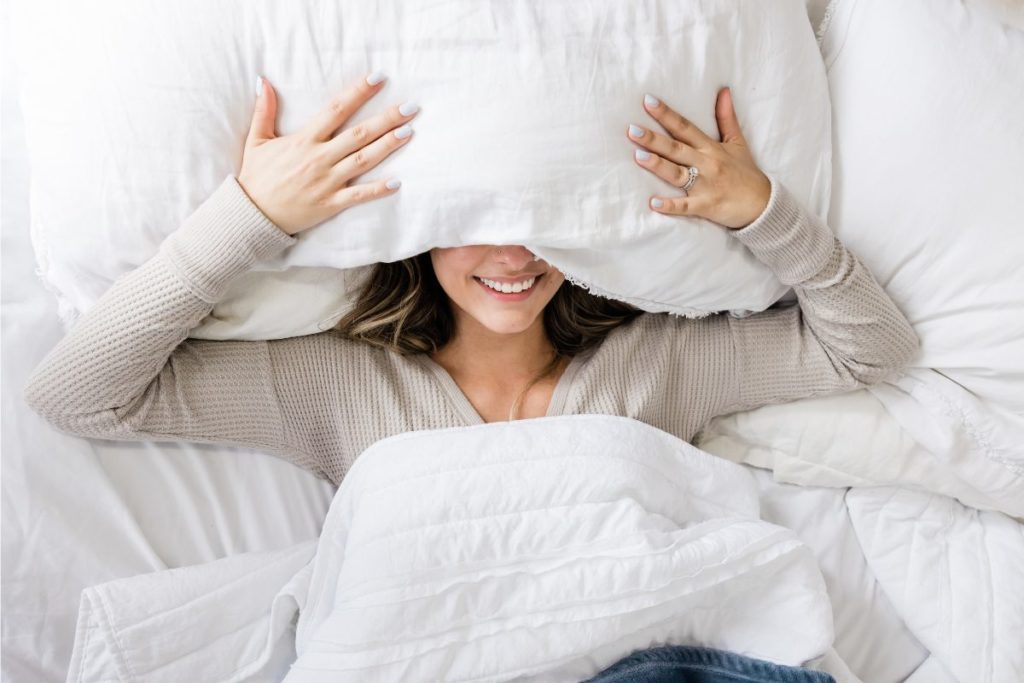
Are you struggling to get a good night’s sleep? Do you toss and turn all night and wake up feeling exhausted?
We know the feeling and it’s not a good one!
But sleeping deeply and getting the restorative rest that you need is totally possible. It’s not only a luxury but also a necessity for your health and well-being.
This guide covers the best tips and tricks to help you sleep deeply, fall asleep quickly, and wake up feeling refreshed and excited to take on the day.
Whether you’re sick of feeling constantly tired or you just want to improve your sleep to improve your overall health, these proven strategies will help you achieve your sleep goals to sleep deeply every night.
Why Deep Sleep Matters
Before we get into all the details on how to improve your sleep, we first need to understand why deep sleep is important.
Deep sleep is one of the four sleep stages that comprise the sleep cycle. It’s during this stage that your body repairs muscles fortifies your immune system, and replenishes your energy stores. Not only does good sleep leave you feeling rested and energized, but it’s also essential for brain function, especially when it comes to your memory and cognitive performance.
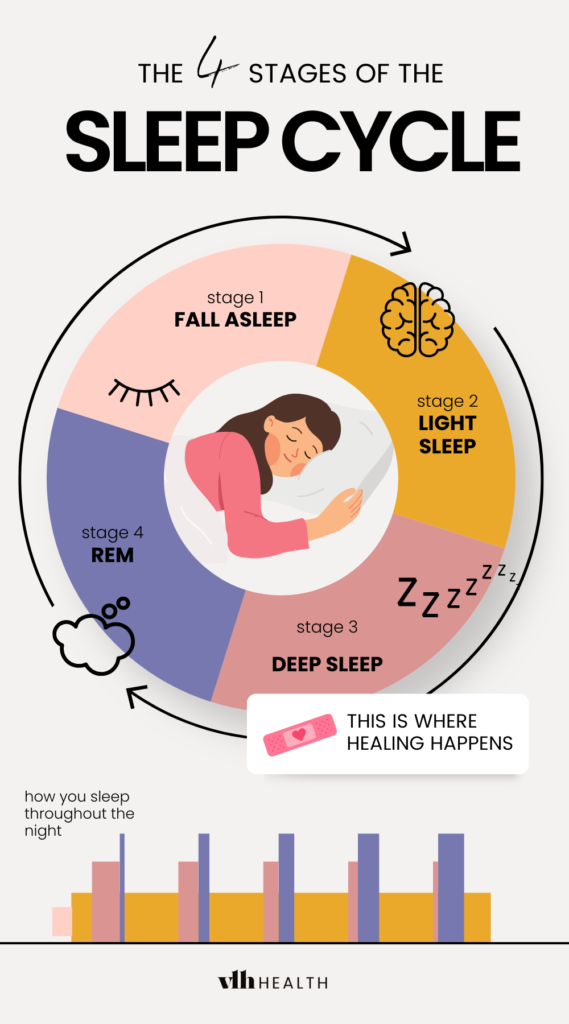
You’re not alone in struggling to get enough deep sleep.
According to the Centers for Disease Control and Prevention, about 1 in 3 adults in the United States report not getting enough sleep each night.
Not the worry, with these 7 simple steps you can increase deep sleep and improve your overall quality of rest and restoration.
7 Tips to Help You Fall Asleep Quickly and Sleep Deeply
These 7 categories cover the best sleep tips for deep sleep. But don’t get overwhelmed by all the information, even making a few small changes can make a big difference in how quickly you fall asleep and your overall sleep quality.
1. Optimize Your Sleep Environment
One of the biggest factors when it comes to sleeping deeply is creating a sleep environment that promotes rest and tranquility.
We’ve written an entire article where we took all the insights from NASA’s study into creating the best sleep environments (to help increase the performance of astronauts) and turned them into actionable insights for your bedroom design.
We’ve recapped a couple of the top tips below:
- Turn the temperature down: Temperature and humidity play a significant role in sleep quality. A bedroom temperature between 77 to 95 degrees is optimal with a humidity level of around 40-60%. Airflow is also associated with better sleep.
- Create a quiet & dark environment: Block out noise and light with blackout curtains, sleep masks, and a white noise machine or earplugs.
- Invest in cozy bedding: The perception of safety and privacy is critical to our health and well-being. Creating a soft and comfortable bed is a great way to increase these feelings.
“Long-term sleep deprivation can reduce quality of life and may increase the risk of health issues including obesity, diabetes, and cardiovascular disease.”
Sleepfoundation.org
2. Design Your Optimal Nighttime Routine
Taking time to develop a mindful nighttime routine can really help in falling asleep quickly. Your body is used to routines and signals so creating a consistent cue that it’s time to rest helps to communicate that it’s time for sleep. Some of our favorite things to add to your routine are:
- Take a hot bath or shower: Your body’s temperature naturally drops 1 to 2 degrees before you go to sleep. By taking a hot shower or bath you can artificially create this same effect. The hot water will increase your body temperature but when you get out, your body’s temperature will drop and you may start to feel sleepy.
- Limit Screen Time: Our screens produce an excess of blue light which actually signals the brain to wake up. Try to limit screen time at least one hour before bed or use a blue-blocking filter or glasses. You can try out some relaxing screen-free activities to pass the time.
- Engage in a relaxing activity: Simple relaxation techniques like meditation, breathwork, and progressive muscle relaxation can calm your body and your mind.
3. How to Fall Asleep Faster: Limit Blue Light Exposure
An essential factor in your circadian rhythm and being able to fall asleep quickly is limiting exposure to blue light. Screens on your phone, computer, and TV all emit a lot of blue light which signals to your body that it’s still daytime and delays the release of a naturally occurring hormone called melatonin. Here are some tips for avoiding overexposure to blue light:
- Use blue light filters on your devices: Enable night mode on your phone and computer to reduce the amount of blue light emitted. Or even better, avoid screens altogether and try out some relaxing screen-free activities in the hour or two before bed. We also love these blue-blocking glasses.
- Set the ambiance: Dim the lights around your house after sunset to signal to your brain that it’s time to start winding down. We also love swapping out the lights in the bedroom with color-changing bulbs so that you can use only red light (the opposite of blue) in the evenings.
4. Nutrition: Foods That Promote Deep Sleep
It should come as no surprise that food and nutrition also play a big role in how well you sleep. What you eat and don’t eat has a significant impact on your sleep.
- What to avoid: Both caffeine and alcohol have been shown to have a negative impact on sleep quality. It’s best to avoid them within at least two to three hours of trying to go to sleep. Being overly full can also have an adverse effect so it’s best to try to eat dinner on the earlier side.
- Foods that help you sleep: Certain foods may promote better sleep due to their specific nutrient and mineral content. Specifically, foods that contain tryptophan, essential vitamins, melatonin, or serotonin, like tart cherry juice, kiwi, pumpkin seeds, and beans may help your sleep. Have you tried the viral Sleepy Girl Mocktail?
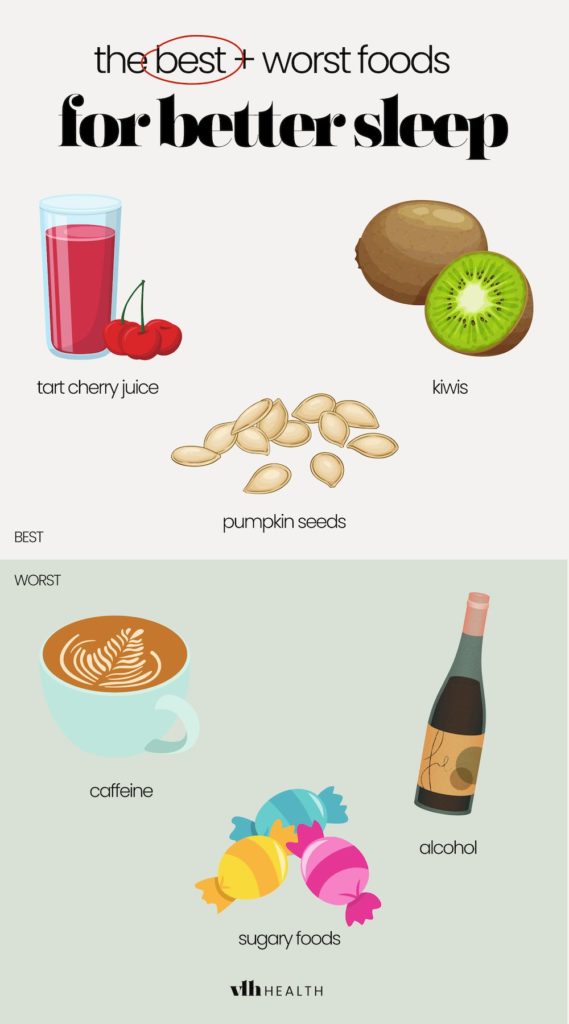
5. Create a Consistent Sleep Schedule & Stick To It
One of the best ways to improve your overall sleep to fall asleep faster and wake up feeling more rested is to stick to a consistent sleep schedule. When you go to bed and wake up at the same time every day, you create a consistent internal clock for your body and it helps to regulate your circadian rhythm. Here’s how to do it:
- Choose a schedule that works for your life: It’s recommended to get at least 7 hours of sleep per night so choose a window of time that’s at least 7 hours long with a set wake-up and bedtime. It’s important to try to stick to this schedule even on weekends so that you don’t throw off your internal clock.
- Be careful with napping: No shade to naps but mindlessly napping can really throw off your sleep schedule. If you’re going to take a nap, keep it short at 20 to 30 minutes maximum.
6. Practice Good Sleep Hygiene
Good sleep hygiene refers to the habits and behaviors you have around your sleep routines. Do you scroll the night away or indulge in sweets right before bed? By sticking to good sleep hygiene and building healthy habits, you can dramatically improve your ability to fall asleep quickly and stay in deep sleep longer throughout the night. Here are some key tips for good sleep hygiene:
- Be consistent with your sleep schedule: Try to wake up and go to bed at the same time every day, including the weekends.
- Avoid large meals and late-night exercise close to bed: Being overly full or having just worked out can disrupt your sleep by keeping your body too alert.
- Avoid stimulants before bed: Caffeine, nicotine, and alcohol can decrease the quality of your sleep and make it difficult to fall into the deep sleep stage or the sleep cycle.
7. Invest In The Right Sleep Products
Sometimes you just need a little extra help when it comes to achieving your sleep goals. Certain supplements and sleep products can help to encourage your body to sleep deeply. Here are a few of our top recommendations:
- Magnesium: Magnesium glycinate in particular is shown to help calm the nervous system and relax your muscles. It can help you fall asleep faster and sleep deeply.
- Aromatherapy: This aromatherapy spray is made of a blend of essential oils, including lavender, vertivert, and camomile. It helps set the perfect sleep mood and signal to your body that it’s time for sleep. The natural formula is proven to help you fall asleep faster and stay asleep throughout the night.
- Mouth Tape: Taping your mouth shut at night can have a huge effect on sleep quality. While it does take some getting used to, mouth tape forces you to breathe through your nose, which is considered ideal. The nose acts as a natural air filter, warming and humidifying the air before it reaches the respiratory system overall leading to improved airflow and oxygenation. It can also reduce snoring!
Final Thoughts
Sleep is a highly underrated factor when it comes to improving your overall quality of life, health, and well-being. By forming good sleep hygiene habits, creating your optimal sleep environment, and practicing mindful nighttime behaviors, you can fall asleep faster, sleep deeply, and wake up feeling refreshed and energized for the day ahead.
Small but powerful changes to your sleep routine can cause big changes in your day-to-day life by increasing your sleep quality and time spent in deep sleep.
If you feel like you’ve tried everything and are still struggling to get good sleep, it might be time to contact a professional. Although it may seem like a big step, sleep is essential for our well-being and worthy of being taken seriously.
Happy sleeping,

A small note for my readers – Over here at VLHhealth, we occasionally include affiliate links in our posts. This means that if you purchase using our links, we will earn a small commission at no extra cost to you.
Frequently Asked Questions (FAQ)
While it’s almost always the opposite case – that we don’t sleep deeply enough – it’s also possible to sleep too deeply due to certain medications or medical conditions. If you think this might be the case for you, it’s best to consult a medical professional.
The natural methods discussed here – such as setting a sleep schedule and limiting screen time – can help you sleep deeply without using any medications.
All kinds of factors can get in the way of good sleep quality. Try to identify any factors in your daily routine that might be disrupting your sleep and make small changes. If you don’t see any improvement, it might be time to bring in professional help.
This guide includes 7 tips to help you sleep deeply. With these recommendations, you should have no problem getting some much-needed zzzs.
One of the biggest factors when it comes to waking up feeling refreshed is keeping a consistent sleep schedule, particularly waking up at the same time every day. This helps your body to regulate your circadian rhythm which is responsible for your energy levels and sleepiness throughout the day.
Dreams are a natural part of the REM part of our sleep cycles. If you are having issues with dreams that wake you up, try some mindfulness and meditation techniques specifically created to reduce nightmares and scary dreams.
Breathing techniques can be particularly helpful when it comes to falling asleep fast. We particularly find the 4-7-8 breathing exercise great for falling asleep faster.
Following a consistent sleep schedule with a mindful nighttime routine can help to train your body to fall asleep more quickly as well as entering the deep sleep stage of the sleep cycle faster.
A combination of factors contributes to your deep sleep. These tips and tricks shared here are all things that can help you sleep more deeply.
There are so many factors that can impact deep sleep. Detractors include stress, sleep disorders, poor lifestyle habits among others. Try making small adjustments to your sleep hygiene to see what works best for improving your sleep. You’ll be surprised how small changes can have a big impact.
If you’ve accidentally consumed caffeine too close to bedtime, you can try drinking herbal tea, meditating, or taking some sleepy time supplements. However, there is no way to remove the caffeine from your system. Try not to stress about it, it will pass in time.
More ideas you’ll love
- 31 Healing Emotional Self-Care Practices Every Woman Should Know
- The Winter Arc: How to Use Winter to Transform into Your Best Self
- 63 Screen-Free Activities for Adults: Fun Things To Do without Your Phone
Pin for later!
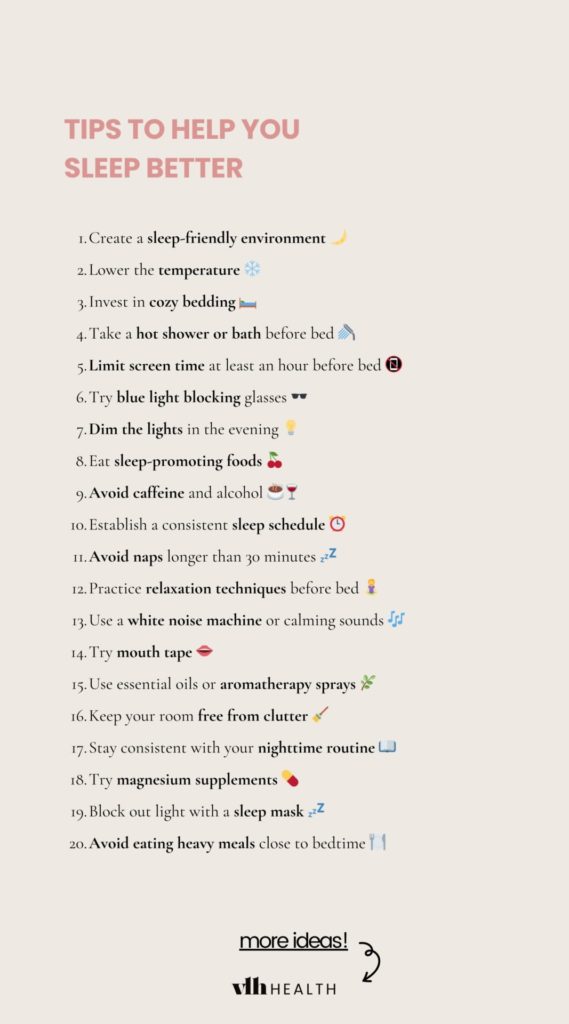

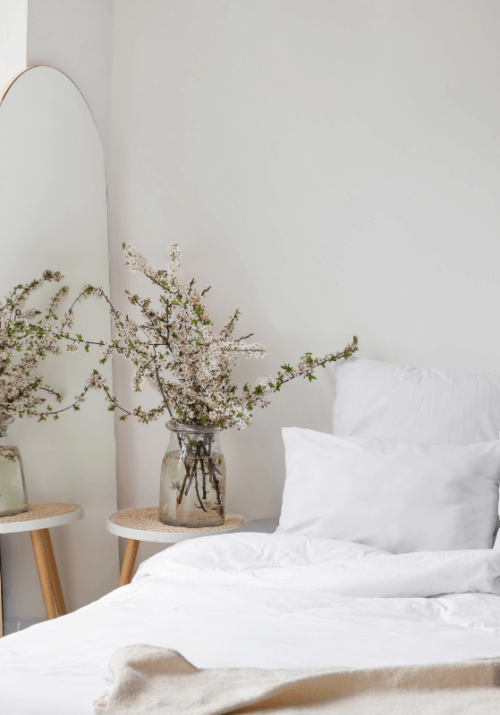
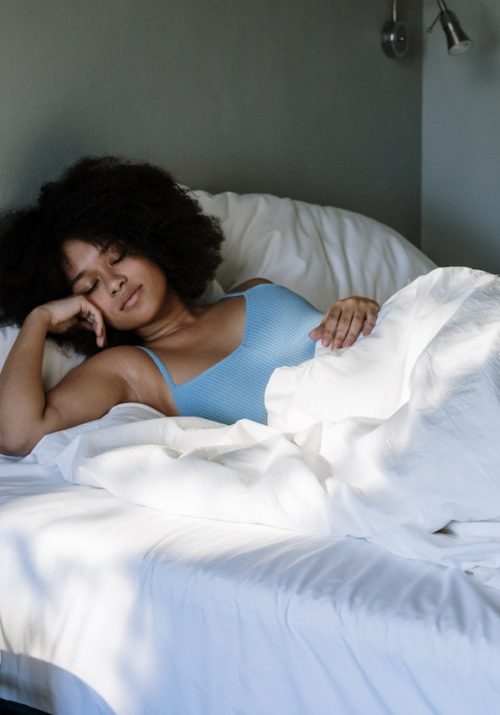
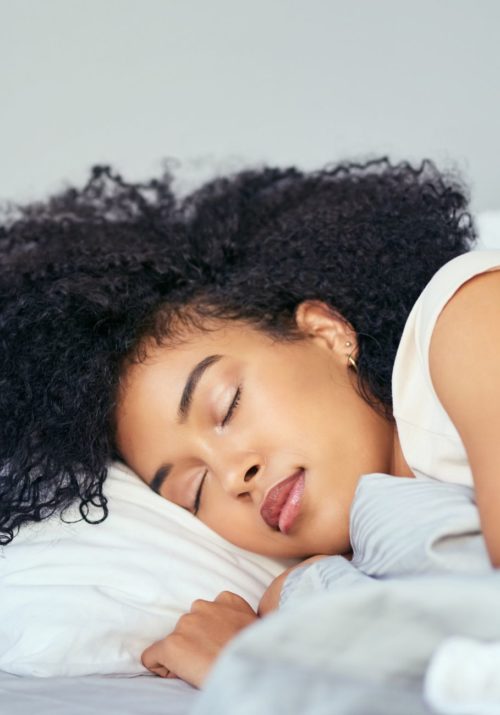
Leave a Reply